We are pleased to announce the 2015-16 recipients for the McKnight Foundation Project Funding, facilitated through YES!.
The project funding is a result of a larger grant received by the YES! Program from The McKnight Foundation in the fall of 2015 to bring climate literacy to YES! students across greater Minnesota. YES! offered $7,000 to YES! teams whose projects engage and empower youth to make an impact in their school and/or community on climate change through hands-on projects. Through a competitive process, seven teams received awards of $1,000. Read about their exciting projects below!
Atwater-Cosmos-Grove City YES! Team
Team Coach: Gabra Lokken
Solar Lights & Garden
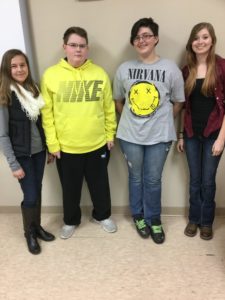 The key goals and outcomes of the project are to research solar energy with the intention of replacing school parking lot lights, as well as work with a small, local community regarding the possibility of implementing a solar garden. Youth will be impacted through a Solar Energy Education Day, introducing young students to the concept of climate change and how renewable energy sources help the planet. YES! team members will be building the models for solar energy demonstrations for students and the community at various functions. The students will also be directly involved in research, meetings with school administration and facilities, and organizations working on the solar garden.
The key goals and outcomes of the project are to research solar energy with the intention of replacing school parking lot lights, as well as work with a small, local community regarding the possibility of implementing a solar garden. Youth will be impacted through a Solar Energy Education Day, introducing young students to the concept of climate change and how renewable energy sources help the planet. YES! team members will be building the models for solar energy demonstrations for students and the community at various functions. The students will also be directly involved in research, meetings with school administration and facilities, and organizations working on the solar garden.
Cherry YES! Team
Team Coach: Rick Pierce
Electric Vehicle
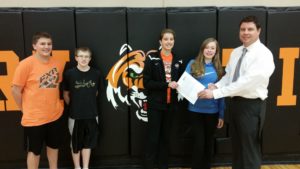 The key goals are to demonstrate an electric vehicle to the students and community. Students will learn how to design, order materials, and build an electric vehicle. Two groups will work on the frame and power system, and the two systems will come together as a dual 30 Volt motor go-kart system. Students researched a design and power system that should achieve a range of 2 miles at 15 miles per hour between charging. This project will showcase the benefits of using an electric vehicle versus a gas automobile that emits greenhouse gases.
The key goals are to demonstrate an electric vehicle to the students and community. Students will learn how to design, order materials, and build an electric vehicle. Two groups will work on the frame and power system, and the two systems will come together as a dual 30 Volt motor go-kart system. Students researched a design and power system that should achieve a range of 2 miles at 15 miles per hour between charging. This project will showcase the benefits of using an electric vehicle versus a gas automobile that emits greenhouse gases.
Glencoe-Silver Lake YES! Team
Team Coach: Mike Sundblad
Electric Vehicle with Solar Power Station
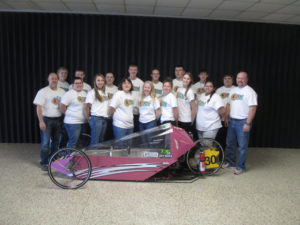 Twenty-two Glencoe-Silver Lake YES! Supermileage Team members are working on this project. They began by contacting local resources to determine how this project may impact the use of energy resources. McLeod County Power Cooperative provided information and connections for the YES! team to develop a plan for this initiative. Students will inform the community of how using hybrids, full electric and high efficiency gasoline powered vehicles can reduce consumption of non-renewable fuel sources. By researching, designing, building, and testing a zero-emissions vehicle, the students will have a platform to demonstrate energy independence to the public.
Twenty-two Glencoe-Silver Lake YES! Supermileage Team members are working on this project. They began by contacting local resources to determine how this project may impact the use of energy resources. McLeod County Power Cooperative provided information and connections for the YES! team to develop a plan for this initiative. Students will inform the community of how using hybrids, full electric and high efficiency gasoline powered vehicles can reduce consumption of non-renewable fuel sources. By researching, designing, building, and testing a zero-emissions vehicle, the students will have a platform to demonstrate energy independence to the public.
Minnesota New Country School YES! Team
Team Coach: David Rice
Local Foods Festival
Minnesota New Country School (MNCS) is a project-based school that has been operating a 500 tree, 6 acre apple orchard since 1997. It initially received a sustainable agriculture grant for $10,000 dollars and used it to plant and fence the orchard. Since then, the school received a farm-to-school grant from Sibley County to help manage the orchard organically. In recent years, the orchard matured, and the school is focusing on picking apples. MNCS will be transitioning into the harvesting and marketing phase of the ongoing sustainable foods project. The school aims to encourage an entrepreneurial spirit in its students, creating opportunities in the rural community. The work promotes student learning while promoting the energy benefits of a sustainable local foods economy.
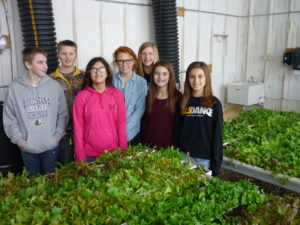
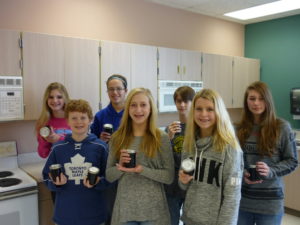 New London-Spicer YES! Team
New London-Spicer YES! Team
Team Coach: Teresa Copley
Energy Wise Local Food
The NL-S YES! Team and student body are living the lessons of sustainability and energy efficiency by growing local food in the campus greenhouse. The team will be using the funding to support several local foods projects including: establishing both an annual and perennial herb garden, adding and replacing apple trees for the purpose of fresh fruit on the lunch line, expanding the grape arbor in the school’s court yard, and involving a larger number of students in the process of growing and preserving food. The stark reality of climate change is a daily awareness when raising crops, both in the green house and in the edible landscape. The changing trend to cloudy cold days vs. sunny cold days, has required careful watering in the greenhouse, with mold a constant problem. The outdoor plantings have suffered flash drought and/or an increase in significant rain events. Monitoring the conditions necessary to harvest a good crop is a way for students to “buy in” to the need for reducing emissions.
Springfield YES! Team
Team Coach: Amanda Meyer
Solar Sidewalks
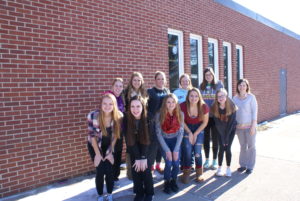 Five years ago, the Springfield YES! Team raised money to purchase and install motion detector-activated, solar lighting on their local river trail. These lights were removed after three years because of consistent vandalism. The team will be using the funding to install the same solar lights at ground level around the school’s sidewalks. Additionally, the team will also offer this installation to local businesses in need of additional lighting. Local electricians (L&S Electric) will be installing the lights and have agreed to include student “apprentices” in this process. Therefore, youth will be involved in the installation and will also benefit from the additional lighting. The combination of solar lighting with motion-detector capabilities reduces the amount of energy typically required for such a project. Additionally, the team is reusing materials instead of purchasing brand new lighting, minimizing manufacturing impacts on climate change.
Five years ago, the Springfield YES! Team raised money to purchase and install motion detector-activated, solar lighting on their local river trail. These lights were removed after three years because of consistent vandalism. The team will be using the funding to install the same solar lights at ground level around the school’s sidewalks. Additionally, the team will also offer this installation to local businesses in need of additional lighting. Local electricians (L&S Electric) will be installing the lights and have agreed to include student “apprentices” in this process. Therefore, youth will be involved in the installation and will also benefit from the additional lighting. The combination of solar lighting with motion-detector capabilities reduces the amount of energy typically required for such a project. Additionally, the team is reusing materials instead of purchasing brand new lighting, minimizing manufacturing impacts on climate change.
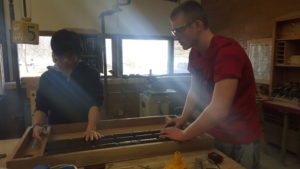 Westbrook-Walnut Grove YES! Team
Westbrook-Walnut Grove YES! Team
Team Coach: Patrick Merrick
Solar Thermal Heater
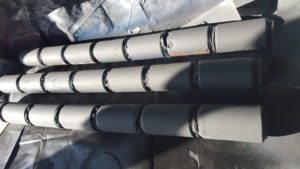 This year, the WWG Earth YES! Class is planning to build solar thermal (pop can) heaters and install them in south-facing windows in both high school buildings. The team also plans to install them in several of the city buildings that they have been monitoring using the B3 Database. The solar heaters will help reduce the schools’ (and City of Westbrook’s) heating bills and help them become one step closer to becoming “green”. As a result, they will help to reduce carbon dioxide emissions and the production of other greenhouse gases.
This year, the WWG Earth YES! Class is planning to build solar thermal (pop can) heaters and install them in south-facing windows in both high school buildings. The team also plans to install them in several of the city buildings that they have been monitoring using the B3 Database. The solar heaters will help reduce the schools’ (and City of Westbrook’s) heating bills and help them become one step closer to becoming “green”. As a result, they will help to reduce carbon dioxide emissions and the production of other greenhouse gases.
